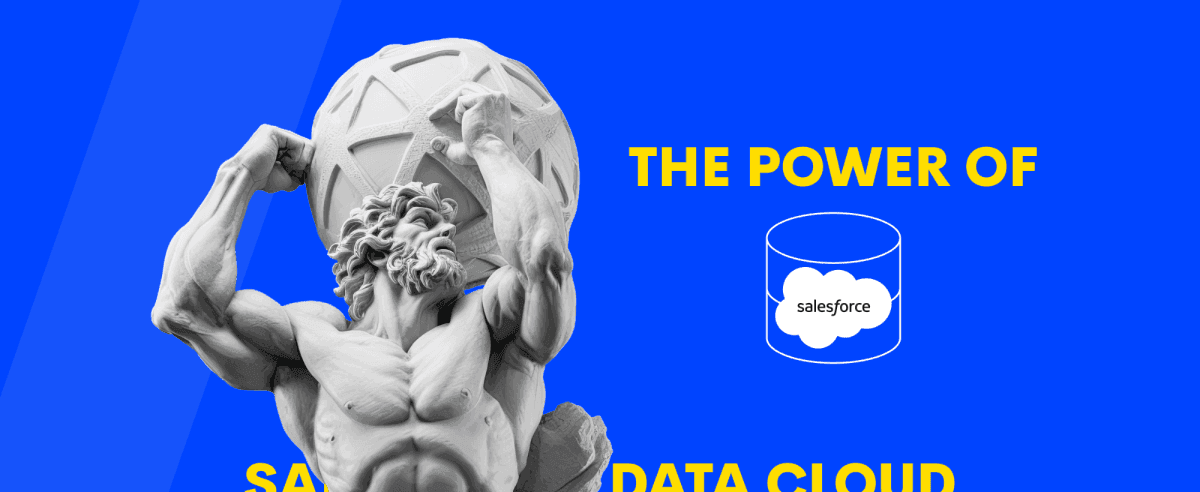Salesforce Data Cloud enables organizations to access and analyze customer data in real-time from various sources, providing businesses with valuable insights for making informed decisions. It bridges the gap between different data sources by unifying them into one platform.
By integrating Tableau, AI/ML features can be used to maximize business insights potentials of Salesforce Data Cloud. With this advanced cloud technology, companies gain a significant edge against their competition in today’s highly competitive market driven mainly by analytical data manipulation and management solutions.
Key Takeaways
- Salesforce Data Cloud is a comprehensive platform that unifies customer data, enables real-time updates and integrates with Salesforce’s suite of products.
- Successful implementation requires thorough assessment of needs, adhering to best practices such as accurate data mapping and team training.
- Leveraging AI & Machine Learning in Salesforce Data Cloud provides organizations with intelligent predictions, recommendations & insights to optimize customer experiences & productivity.
Understanding Salesforce Data Cloud
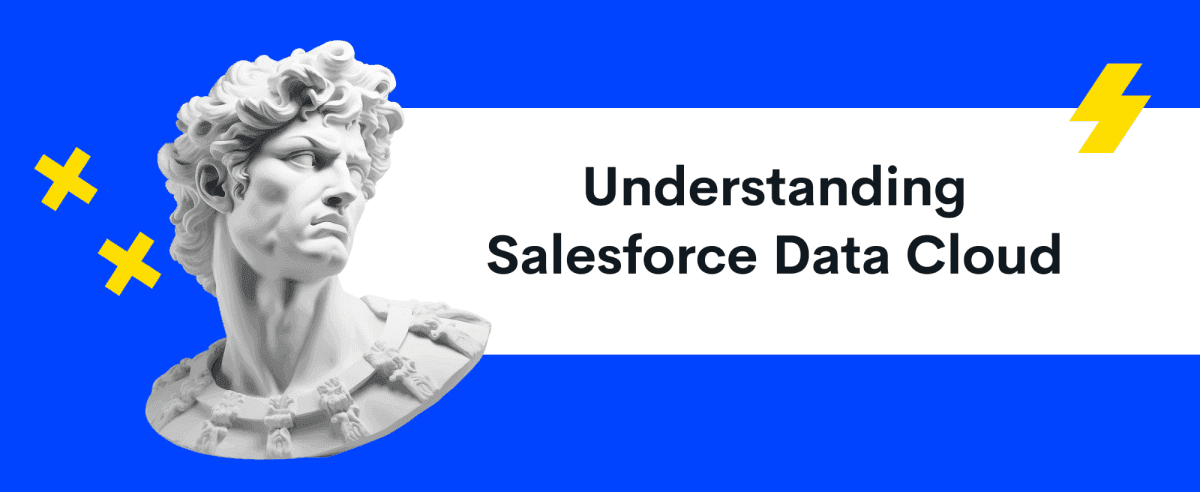
Salesforce Data Cloud is a sophisticated platform designed to capture and integrate real-time customer data securely. It has the capability of bringing together all kinds of customer information, including unstructured data, into one unified profile in order for businesses to make informed decisions based on the insights gained from their customers’ journey.
Its key features such as harmonized data updates and integration with Salesforce products enables organizations to enhance their marketing spend by making use of advanced analytics that come from its comprehensive source for this one unified customer data profile.
This would empower them towards improving overall experiences across different interactions thus providing an improved experience tailored around individual needs through analyses made within a single, real-time professional view bolstered with reliable details regarding each consumer’s habits or preferences over time.
Key Features of Salesforce Data Cloud
The Salesforce Data Cloud is known for its data harmonization, which standardizes and consolidates different sources of customer information. This allows businesses to achieve comprehensive insight into their clients while also enjoying the added benefit of real-time updates regarding engagement data that allow them to react quickly in today’s everchanging market.
This cloud merges with other platforms like Service Cloud, Marketing Cloud and SalesCloud providing a single view across all types of customer data allowing companies to make more informed decisions and optimize marketing spend, leading to improved experiences overall.
The Role of Salesforce Data Cloud in Customer Experience
Salesforce Data Cloud is essential in upgrading customer experiences by offering unified, unified customer profiles, and real-time data access. For example, eToro has incorporated Service Cloud with Einstein, Marketing Cloud, Mulesoft & Tableau to amplify their services while ensuring secure data management including first party advertising information.
With the help of this cloud service companies have become capable of delivering customized experiences using centralized user profiles as well as up-to-date details stored on the system.
Net ZeroCloud is another best demonstration where Salesforce’s innovative ability plays an important role in providing customers with ESG reports and identity resolution processes via AI driven features such as chat replay recommendations for agents or support reps which enhances interaction even among them or between businesses/brands – customers thereby bettering customer relations & the entire customer experience all together along with improved satisfaction from both sides.
Integrating Salesforce Data Cloud with Tableau
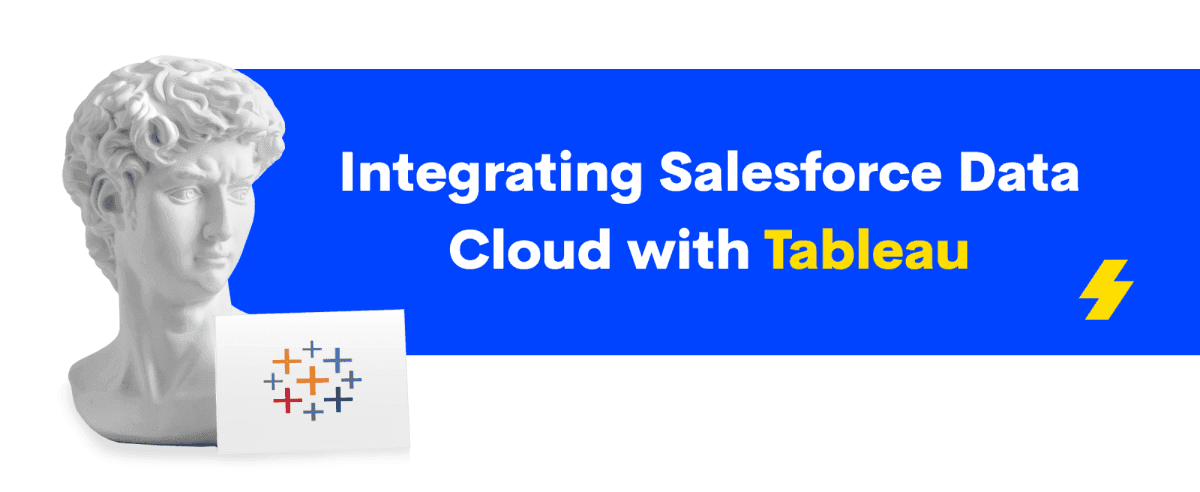
When Salesforce Data Cloud is connected to Tableau, businesses can benefit from an enhanced data visualization and business intelligence layer. This provides access to customer insights that help companies make informed decisions and improve their customer experience.
The connection of the two platforms on the Salesforce platform allows for seamless integration between them so that valuable insight regarding data can be extracted accurately with ease.
To integrate these technologies, a site admin should login into Tableau cloud before connecting with Customer Data Platform and authorizing when prompted. In order to connect, setup up a source connection properly. Once done, there will no longer be any barrier restricting interactions within both systems, allowing customers’ information to flow freely throughout various channels of analysis and visualizations.
In summary, by bringing together SaleForce’s powerful database storage technology along with cutting-edge interactive capabilities through Tablesu, businesses are able gain deep insights from analytics thus driving increased ROI via better understanding clients needs as well as exceeding expectations across product or service offerings alike.
Benefits of Combining Data Cloud and Tableau
Bringing together Salesforce Data Cloud and Tableau results in multiple advantages, such as data integration, state-of-the-art analytics, and predictive capacities. Companies can enhance their data visualization processes by harmonizing datasets to generate a seamless user experience while increasing productivity at the same time.
This fusion also lends businesses an edge in sales product marketing, by utilizing advanced natural language processing abilities along with superior augmented analytics provided by this duo.
By merging these two technologies one opens up various new opportunities when it comes to predictions including: enrichment of the data lake of information, machine learning powered choices, fast analysis options, and realignment of all collected data – giving firms leverage over competitors regarding decision making competences, which is invaluable for future success prospects.
The combination between Salesforce’s cloud services combined with Tableau’s powerful software gives companies access to sophisticated prediction capabilities that would otherwise remain out of reach, enabling them to move towards successful outcomes due to better informed decisions.
Implementing Salesforce Data Cloud in Your Organization
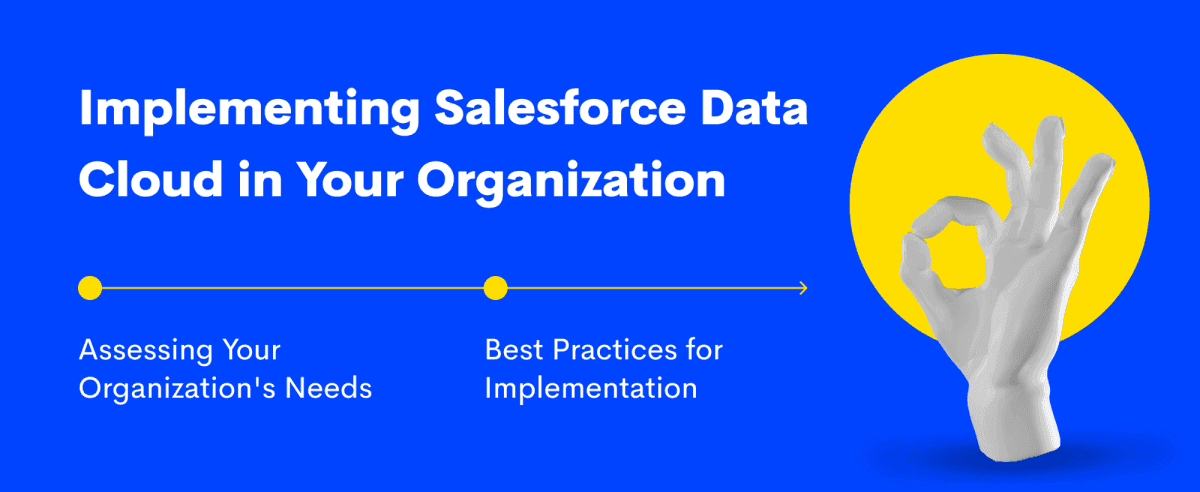
Before applying Salesforce Data Cloud to an organization, it is essential to assess the needs of the company and analyze existing data models, methods and structures. This article shares useful tips for introducing Data Cloud in any enterprise context.
The deployment process encompasses many actors including project contributors, veteran users with knowledge on cloud technologies as well as developers proficient in back-end frameworks. Configuring salesforce so that all systems integrate successfully necessitates understanding source components necessary for optimal operation when utilizing this powerful toolset of capabilities from Salesforce platform services and other systems such as artificial intelligence (AI) or Internet of Things (IoT).
In order to facilitate a smooth implementation strategy backed by robust data protection measures designed according to best practices one must look into different facets carefully ranging from organizational structure analysis along with examining present workflows processes then finally assessing how contemporary approaches might be enhanced using modern automation solutions offered through seamless integration leveraging world-class technology like those provided within The Salescloud family.
Assessing Your Organization's Needs
It is essential to accurately identify the use cases for Salesforce Data Cloud in order to achieve a successful implementation. This includes accessing and leveraging contacts, organizational structure information, industry-specific data models/processes and insights that can be used when customizing marketing campaigns as well as refining data management practices.
Before beginning with integration of any necessary sources, it’s important to establish validation processes while confirming permissions are secure along with credentials plus making sure their accuracy within both quality & organization remains uncompromised.
Depending on all your customer data needs, there are enterprise solutions or modern options available from various architectures which encompass salesforce systems/data cloud integrations specifically tailored for an organizations environment.
Analyzing current systems,data and procedures helps organize preparations needed prior to implementing this service successfully - taking into account stakeholders ideas/needs, objectives already set by business strategy.Knowledge about factors such as communication skills, collaboration experience + project resources methodologies expertise together form part of datacloud preparation prerequisites get them up and running smoothly without hassle.
Best Practices for Implementation
When utilizing Salesforce Data Cloud, it is paramount to abide by best practices. This includes data mapping accuracy, training of the team, constant monitoring and optimization along with including all relevant stakeholders from the beginning.
It also involves organizing for migration and cleanup activities while customizing the data model based on needs as well as improving acquired data quality in its platform. Establishing an appropriate strategy related to managing this same information should be planned ahead too!
To ensure a successful implementation process when using Salesforce Data Cloud services, you must partner up with an experienced provider who understands your organization’s specific objectives - taking into consideration any pre-existing models or requirements already outlined before starting working together.
After checking that everything runs correctly, Security measures are taken care of within the sales department and cloud, ensuring utmost attention over ethically managed data security protocols once operational tasks become set forth.
In addition, what follows is a comprehensive overview outlining how said procedures involving confidentiality guarantee higher standards overall where confidential matters arise out place special importance on such cases prioritization purposes at scale.
Ensuring Data Security and Ethics with Salesforce Data Cloud
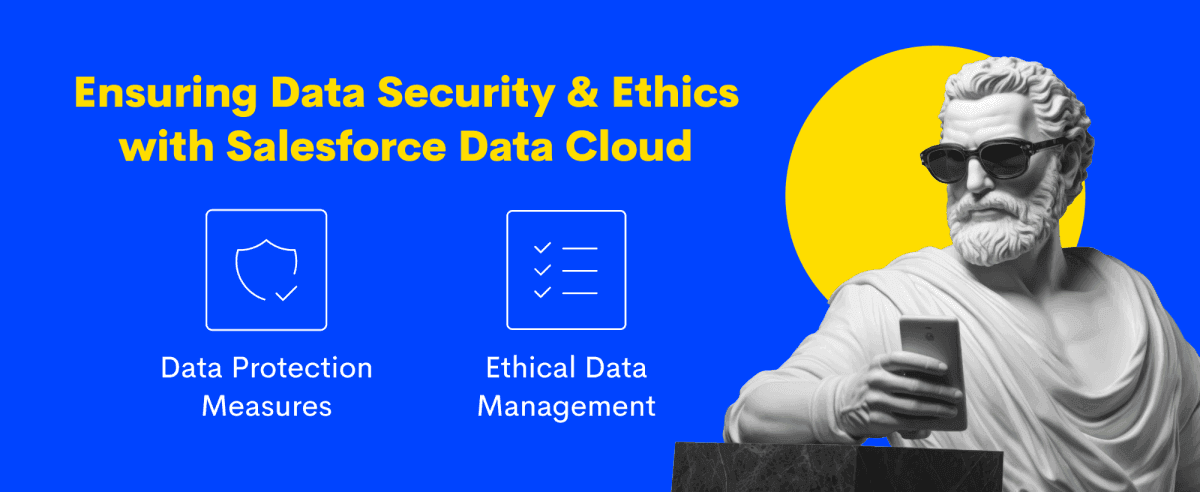
Salesforce Data Cloud is committed to ensuring data security and ethical information management through multiple measures. These include consent management, policy automation, as well as managing policies related to the usage of sensitive records.
This helps preserve customer trust by defending important details while granting users control over their data utilization and providing organizations with legitimate permission rules for compliance purposes.
In order to keep up with privacy regulations, remain transparent about its practices, and offer accountable use of customer’s personal data, Salesforce Data Cloud has adopted several protection procedures that guarantee ethical handling.
In this article we will be reviewing these safeguards employed in a Salesforce cloud environment focused on properly preserving secure user info across all connected clouds & services offered by salesforces globally along with existing systems utilized by companies worldwide.
Data Protection Measures
Data security and privacy is of utmost importance to Salesforce Data Cloud, which has implemented various measures such as SOC 2 Type 2 compliance, encryption, and comprehensive access controls. By achieving SOC2 type two certification, the cloud provider affirms its dedication to protecting customer data. Protections are offered through utilization of AES128 encryption along with Salesforce Shield Encryption technology for encrypting information within the sales force platform’s database.
Salesforce also employs rigorous control procedures in order to guarantee that only authorized personnel can gain entry into secured records on an individual basis or based off a company’s specific needs using tools like record-level security or sharing features set up by salesforce partner or clients themselves.
In this following section we will discuss why ethical management of user data held at SalesForce Data Cloud is essential.
Ethical Data Management
Salesforce Data Cloud takes proactive steps to ensure customer data protection, with highly secure systems as well as external auditors and internal safeguards that check regularly.
Salesforce’s approach stresses the need for security transparency around their handling of customers’ information, making sure users can trust them in regards to privacy regulations. This helps prioritize preserving data integrity while also providing useful insights into businesses through AI and machine learning applications hosted on Salesforce Data Cloud platforms.
The implementation of robust data safety protocols is key when dealing with sensitive user information - these include offering clear value exchange models regarding usage policies, proper individual details collection, and thoroughly implementing strong protective actions. Ensuring the highest levels of care are taken throughout every step involving your customer’s private records management.
These practices follow ethical guidelines in order to guarantee fair treatment between both parties: sales force/data cloud companies together with its clientele base who ultimately will benefit from reliable services under established legal requirements set forth by applicable laws concerning personal info sharing or consumption within a business framework context such as this one implemented by SalesForce today globally.
Leveraging AI and Machine Learning in Salesforce Data Cloud
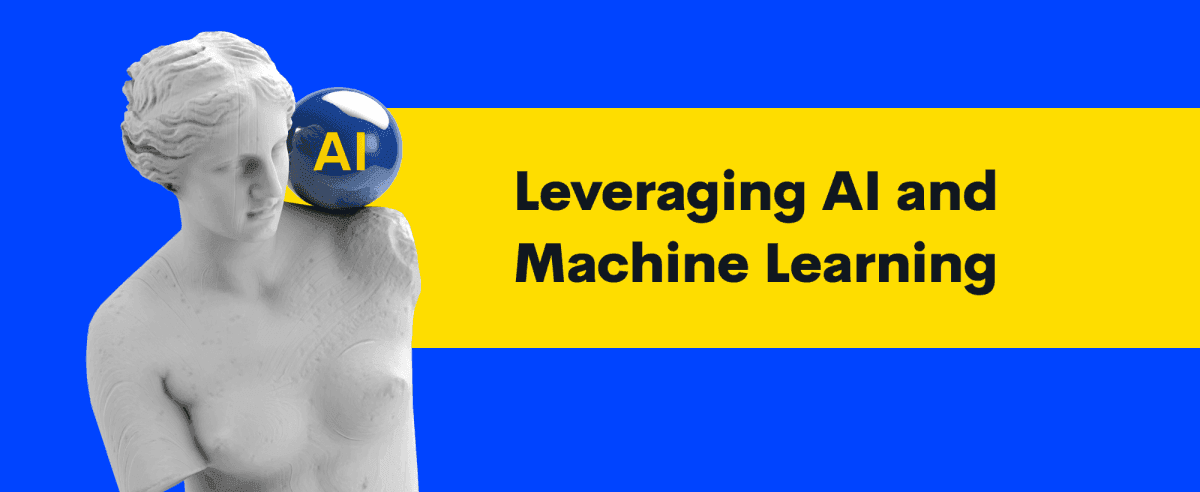
By integrating Salesforce Data Cloud and its AI-powered features into their workflows, businesses can leverage the power of machine learning to gain real-time insights. Powered by Einstein, data cloud offers powerful capabilities such as Generative AI for ESG reporting or Ask Concierge & Performance Headquarters that are designed to enrich customer experiences while improving company productivity at the same time. By understanding how these innovative tools function and leveraging them in every way possible organizations will be able to unlock the full potential of artificial intelligence within Salesforce’s platform easily adapting it with new advancements when needed.
AI-powered Features
Salesforce Data Cloud has a wide selection of AI-driven capabilities, such as Einstein GPT for combining CRM data with public and private models to provide customers with natural language prompts adapted to their requirements. Conversational AI – enabled by the Einstein Copilot tool – is integrated into every Salesforce application facilitating users in conversing naturally while offering them reliable advice based on unique Salesforce Data Cloud information.
The Real-time analytics option permits businesses access streaming data from multiple digital channels which are refreshed per millisecond, allowing salesforce customers more instantaneous communication opportunities within real time scenarios. This section will explain how these machine learning features can be optimized when using Salesforce Data Cloud.
By leveraging all that this amazing platform offers companies have the capacity to easily make informed decisions based upon comprehensive insights related not only to customer behavior but also merging up diverse kinds of datasets enabling tailored experiences suited specifically to each customer graph its particularities.This ensures better results across an array of objectives whether it relates sales or marketing, optimizing resources usage along whole organisation workflows.
By harnessing the full potential of this advanced platform, businesses can make well-informed decisions based on comprehensive insights. These insights are not only related to customer behavior, but also stem from the merging of diverse datasets, enabling the creation of experiences uniquely tailored to each customer's profile. This leads to improved outcomes across various objectives, whether they are related to sales or marketing, and optimizes resource usage across the entire organization.
As a result, businesses can expect a significant increase in their return on investment (ROI) over the long term, especially when it comes to projects that involve the deployment of cloud technology. This state-of-the-art software framework empowers countless successful enterprise IT ventures, ensuring their ability to withstand the relentless cycles of change inherent in today's fast-paced business environment.
This future-proof capability provides a significant competitive advantage, particularly in terms of managing the risks and constraints associated with investment. By adhering to contemporary norms and responding to the evolving demands of the marketplace, businesses can effectively bridge generation gaps, address legal matters, and ensure compliance with today's regulations. This allows them to focus on their target markets and key sectors, paving the way for sustainable partnerships and engagements.
Maximizing AI Potential
Maximizing the opportunities of AI within Salesforce Data Cloud requires familiarity with its features, seamless integration into workflows and continuous update on advancements. Governance in this context is crucial for providing correct data output while cultivating trust in the technology’s potential. By incorporating machine learning techniques to augment Salesforce Data Cloud along with staying up-to-date about new developments pertaining to AI, businesses are well positioned for adapting changes that bring maximum benefits from innovative resources like Vertex by Google or Einstein GPT &Flow offered through CRM platforms provided by Salesforce – thus unlocking essential insights derived from cloud based CRM (Customer Relationship Management) information accesses.
Summary
The Salesforce Data Cloud is a platform that collects customer data in real-time, giving businesses access to valuable insights which can then be visualized with Tableau. Through leveraging AI and machine learning technology alongside best practice implementation processes, organizations are able to unify data and to capitalize on this powerful toolset for improved customer experiences as well as substantial growth potentials.
By utilizing the full capacity of data cloud makes the Salesforce Data Cloud solution suite, companies can stay ahead of their competition when it comes to managing customers’ data while also innovating through enhanced decision making capabilities enabled by timely information obtained from such resources. Armed with deep knowledge about its consumers base aided by relevant analytics tools, more adeptly personalized services or products may now be achievable, allowing firms out there greater prospects at success within ever expanding markets today!
FAQ
Is data cloud free for Salesforce?
Salesforce announced free Data Cloud licenses for Enterprise Edition and above customers at Dreamforce 2023. Customers can sign up for free Data Cloud provisioning on September 19th, 2023.
Is Salesforce Genie and data cloud the same?
Salesforce Data Cloud has the ability to capture real-time data streams in order to offer personalized customer experiences, all while harmonizing data, while storing it at immense capacity. In other words, this platform is more commonly known as Salesforce Genie.
What are the key features of Salesforce Data Cloud?
Salesforce Data Cloud offers the capability to manage business data, including unstructured data, with real-time updates that integrate seamlessly into other Salesforce products. This powerful cloud platform provides harmonization of all types of data for maximum efficiency.
What is the old name of Salesforce Data Cloud?
Salesforce has gone through many renaming cycles over time, transitioning from Salesforce Marketing Cloud and ExactTarget to Customer 360 Audiences, Data Platforms like Salesforce CDP (Customer Data Platform) and Genie as well as its current moniker—the Salesforce Data Cloud. This powerful platform is a great resource for customer data management.
How does Salesforce Data Cloud contribute to improving customer experiences?
Salesforce Data Cloud offers custom customer experiences with access to a unified view, profiles and real-time data, ultimately enhancing the overall experience for customers. By leveraging cloud technology and Salesforce’s capabilities, organizations can gain quick insight into their data to create meaningful data.






